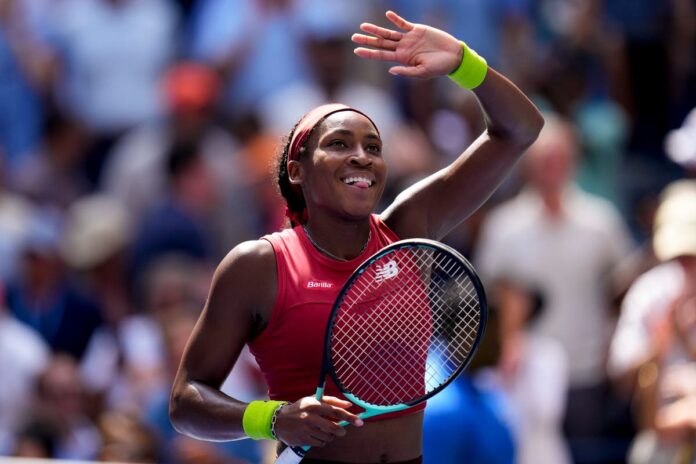Coco Gauff knows what it takes to reach a Grand Slam final. Been there, done that. What she hasn’t experienced is winning a major championship. So her first trip to the semifinals at the U.S. Open does not leave her satisfied at all, no matter how dominant the performance was that got her to that stage. ‘The dreams never came with the people in the stands and autographs. That was never in the dreams,’ the 19-year-old from Florida said. ‘It was just, like, the trophy.’ That hardware is getting closer. Gauff dealt just fine with the heat, the humidity and a big-hitting opponent to defeat Jelena Ostapenko 6-0, 6-2 on Tuesday, becoming the first American teenager to reach the final four at Flushing Meadows since Serena Williams in 2001. ‘Even though (by) the semifinals, (in) theory, if you want to win, there’s two matches left, you can’t think like that,’ Gauff said. ‘I’m still in the mindset that I’m in the beginning of the tournament. That’s what I have learned in the past (from) being in quarterfinals: Before, I would think, ‘Close to the end.’ But right now, I have the mentality that I told myself, ‘I still have another two weeks to play.’ So that’s where my mind is at. Then, obviously when it’s over, it’s over. But right now, I’m just saying, ‘Another two weeks.'” This was the 16th victory in her past 17 matches for Gauff, and a first-round exit at Wimbledon in July sure feels like ages ago. Her best showing at a major was making it to the final at Roland Garros last year. Gauff lost that title match to Iga Swiatek and those two could have met again in the U.S. Open quarterfinals. But Swiatek didn’t make it, instead losing to Ostapenko in the fourth round. That defeat not only ended Swiatek’s title defense but also meant she will relinquish her spot at No. 1 in the WTA rankings to Aryna Sabalenka next week. ‘I was shocked,’ Gauff said. When she is on the mark, as she was Sunday night against Swiatek, Ostapenko can be as challenging an opponent as there is, because she goes for broke on nearly every stroke. If the balls land in, she is in business. When they don’t, she is in trouble. She finished with 36 unforced errors Tuesday; Gauff had 14. ‘Honestly,’ said Ostapenko, who beat Gauff at the Australian Open in January, ‘I was expecting a little bit more from her today.’ Ostapenko complained that she had a short turnaround because that Swiatek victory ended so late and then the Gauff match was so early – it began shortly after noon, with the temperature at 90 degrees Fahrenheit (32 Celsius) and the humidity above 50%, prompting a rule change about the use of the roofs on the two largest arenas. ‘I was pretty sure (I was) going to play at night session, because that’s what they told me,’ Ostapenko said. ‘When the schedule came out, I saw I’m playing first match and was, like, ‘Wow, that’s a little bit strange scheduling.” Tournament referee Jake Garner said Ostapenko’s team did not request – and was not informed she would receive – a late start. ‘She certainly wasn’t told anything from me or anybody on the referee’s staff. There’s always conversations between coaches, players to the referee’s, team tournament management, about the schedule, but I don’t believe that she was promised anything about specifically when she would play,’ Garner said. ‘And that would be very unusual for anybody to be promised anything that far in advance.’ In the semifinals Thursday, Gauff will face No. 10 Karolina Muchova of the Czech Republic or No. 30 Sorana Cirstea of Romania. They were scheduled to play Tuesday night. In Tuesday’s first men’s quarterfinal, which was played with the Arthur Ashe Stadium roof partly closed, 23-time major champion Novak Djokovic of Serbia defeated No. 9 Taylor Fritz of the United States 6-1, 6-4, 6-4. Djokovic next meets No. 10 Frances Tiafoe or unseeded Ben Shelton, who joined Fritz in making this the first time since 2005 that three U.S. men were in the final eight in New York. Gauff, naturally, had the pro-American crowd on her side. They applauded and yelled for her even before she stepped out on court, reacting when she was shown on the arena’s video screens during a prematch TV interview. The roars crescendoed when Gauff was introduced before play began. And once it did, she got off to about as good a start as possible, grabbing 12 of the opening 15 points to go up by two breaks for a 3-0 lead after just 10 minutes. Only one of those points for the American arrived via her own clean winner. She didn’t need to produce those sorts of shots, though. That’s because Ostapenko kept missing, to the tune of 10 unforced errors in that span alone. After many of those miscues, she would turn toward her guest box and glare at her entourage, as if perhaps it were their fault. Gauff didn’t need to try to force things. To her credit, she didn’t. What she did do was use her instincts, smarts and speed to get to Ostapenko’s best groundstrokes and send them back over to the other side. That exemplary defense would extend points, more often than not, until Ostapenko erred. ‘Today was the best match I’ve played, for sure,’ Gauff said, ‘even though it wasn’t how I like to play.’ ___ AP tennis coverage: https://apnews.com/hub/tennis
Coco Gauff reaches her first US Open semifinal at age 19. Novak Djokovic makes it to his 13th
Sourceindependent.co.uk
RELATED ARTICLES


